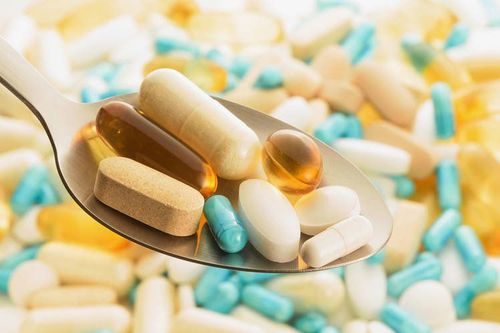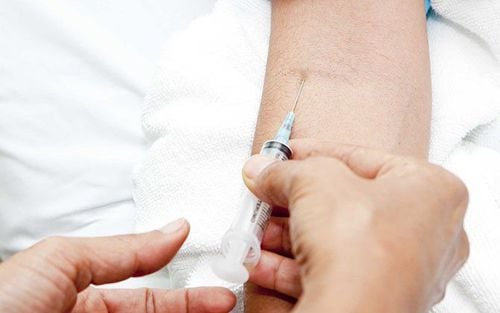This is an automatically translated article.
Opioid analgesics are a group of powerful pain relievers, giving quick and immediate effects but with a high risk of addiction. An overdose of opioids can cause toxicity. What precautions should be taken when using opioid pain relievers to avoid poisoning? And how should opioid poisoning be handled?
1. Poisoning when using an opioid overdose
Opioids are a group of addictive drugs that have strong pain-relieving effects, especially for cancer patients who have trauma or pain after surgery. Opioids have the ability to reduce pain thanks to the mechanism of action on the central and peripheral nervous system to reduce pain signal transmission to the brain, and at the same time stimulate to increase the patient's pain threshold. Opioids belong to the group of prescription drugs, requiring a doctor's prescription when used.Opioid analgesics are divided into 2 main groups:
Naturally derived drugs: morphine, opium and codeine. Synthetic drugs: heroin, fentanyl, tramadol... In order for the drug to have maximum therapeutic effect, it is necessary to increase the dose when used.
Due to its high effectiveness, the phenomenon of drug abuse is increasing not only in one country but all over the world. According to a 2015 census, there were 330,445 cases of opioid abuse in the UK. Between 2015 and 2018, 81% of all European deaths were related to opioids.
In 2017, the US Centers for Disease Control and Prevention reported that up to 130 deaths a day were attributed to overdoses of opioid painkillers.
In Vietnam, there are no specific statistics yet. However, the situation of patients voluntarily taking drugs in general, and self-administering opioids in particular are increasing day by day. Along with that, pharmacists or some pharmacies also arbitrarily sell opioid drugs to patients without strictly complying with prescription laws.
The abuse and overdose of opioids for a long time will lead to a very high risk of addiction. Opioid addiction is not a single medical condition. The signs of opioid addiction are similar to those of drug addiction.
Common opioid addiction symptoms: impaired immune system function makes resistance weaker, susceptible to immune-related diseases, insomnia, loss of appetite, rapid weight loss, pupil constriction... The patient died from multiple comorbidities following opioid infection.
There are quite a few people who wonder why opioids are so addictive? Explaining this, experts analyze that: The use of opioid pain relievers on patients will stimulate the brain's excitement center, releasing endorphins (neurotransmitters that help alleviate pain sensations). , make the patient more comfortable Opioid drugs have a dependence, if the patient is taking the drug, stopping suddenly will cause symptoms such as withdrawal syndrome. Irresistible but continuous use out of control causes overdose, drug poisoning.
2. Treatment of opioid poisoning and notes when taking opioid analgesics.
Opioid addiction or opioid poisoning are both dangerous and life-threatening conditions that need to be treated as soon as possible.
Treatment and management of opioid poisoning, the first important thing is to ensure the patient's respiratory function. Ensure airway clearance by:
Place the patient in a supine position if there are no signs of respiratory distress. Squeeze the balloon, breathe mask if the patient stops breathing. The patient may be prescribed a combination of opioid antidote as follows: Naloxon .
This is a specific opioid antidote, indicated for use in cases of opioid overdose and poisoning. Dosage ranges from 0.4 to 2 mg intravenously or intramuscularly. The drug is very potent for a short time, patients with an opioid overdose may wake up 1 to 3 minutes after taking naloxone. In some cases, your doctor may consider intubation when needed.
To avoid poisoning, opioid overdose, when using opioid pain relievers, it is necessary to note a few things:
Use the right dose, follow the doctor's instructions and instructions. Do not stop the drug suddenly, but reduce the dose gradually. In case of getting used to the drug or being addicted to the drug, it is necessary to notify the doctor to adjust the appropriate dose. Opioids should be taken for a short period of time, and it is best and safest to take them for only a few days. In case of prolonged use, consult a doctor. Avoid using opioids for chronic pain. In addition, to avoid the side effects of the drug, you should learn the basics of the opioid drug class before using it. This is not only beneficial for yourself but also necessary for your loved ones when using the drug. Opioids can be used in people addicted to drugs but need to adjust the dose accordingly. Be especially careful if the patient is taking medication for anxiety, has trouble sleeping, or has a seizure because it can increase the side effects of the drug. Store medicines properly. Note that even a small dose of opioids for adults can be fatal for children. Therefore, the medicine must be kept out of reach of children. Do not keep or stockpile opioid medications in the home. If the unused medicine is left over, it can be treated by flushing it down the toilet. In general, opioid pain relievers have a very high risk of addiction, should not be abused, do not take high doses for a long time. Opioid poisoning like drug addicts has serious effects on the patient's health, severe can lead to death. Do not self-medicate without consulting a specialist.
Please dial HOTLINE for more information or register for an appointment HERE. Download MyVinmec app to make appointments faster and to manage your bookings easily.













